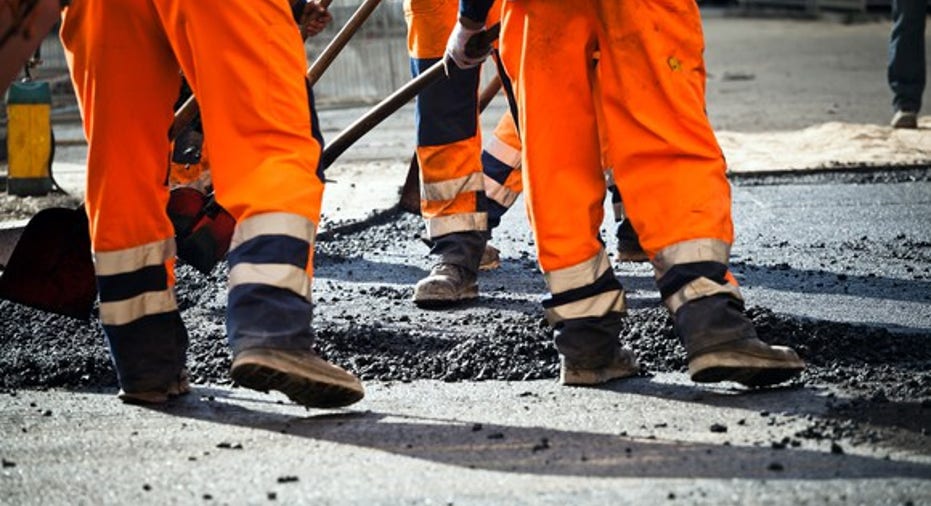Don't let roadwork shut down your small business

Construction area ahead. Prepare to stop.
Few things in life invoke more contempt than those flashing street markers that signal a sharp turn for the worse lies straight ahead - roadwork.
There's little appeal in the roar of a jackhammer as it plows through blacktop, the cries of car horns sounded by frustrated drivers, or the odor of burning asphalt as it splatters onto the ground.
However, as disagreeable as roadwork is for drivers and their passengers, it's 100 times worse for entrepreneurs whose small businesses are located in, or near, the torn up streets and sidewalks.
In fact, according to some owners, road work might be among the most serious challenges that a small business will ever face.
Roadwork isn't pretty A road project in Millburn, New Jersey, intended to widen sidewalks and improve the downtown area's aesthetics, triggered wide ranging outcry as construction led to traffic jams, confusing detours and big rigs that were arguably too big for the town's small streets.
The ire sparked a Facebook page titled Millburn "Complete" Insanity.
"We saw an immediate decline in foot traffic," said Andrew Morgan, the owner of the Millburn Deli, a popular sandwich shop, as he explained just how seriously the construction affected his shop.
"During the (worst of the) construction we saw a roughly 38% decline in customer foot traffic during the business week. Weekends were slightly less impacted because the construction wasn't going on then."
And Morgan experienced those double digit declines despite implementing some innovative techniques intended to counter the negative effects.
"We began more heavily marketing online ordering so people could pick up their orders without having to wait in line in the store to pay. We even explored doing some curbside pickup so folks didn't even have to park," he said.
Different coast, same problem Business owners on the West Coast are all too very familiar with the hardships presented by roadwork, too. According to the INRIX Traffic Scorecard, Seattle is among the 20 worst places in the world for traffic, with drivers delayed an average of 55 hours in 2016. Road work only acerbates the congestion.
The issue was top of mind for entrepreneur Ali Ghambari as he made expansion plans for his small business, Cherry Street Coffee. "I delayed openings and once, pushed back the entire construction timetable of a new store because I found out about road work," he said.
Of course, Ghambari concedes the impact of roadwork is far more pronounced on stores that are already open. In some cases Seattle has compensated business owners for the inconvenience. In 2016 the city issued checks for $25,000 to some small businesses that could prove financial harm caused by ongoing roadwork.
"I'm hoping they make similar funding available in the future," Ghambari added, as he explained ways in which he might attempt to offset a drop in sales. "Also I might talk to the landlord," he said, "about a temporary rent reduction."
Surprise! Surprise! Among the most frustrating aspects of road work is the element of surprise. Unless a small business regularly talks with their state's Department of Transportation, there's often little warning of an impending project that could last months or longer.
In Rhode Island, Rep. Lauren Carson, D-Newport, is attempting to improve the lines of communication. She's sponsored a bill that would order the state to provide small businesses with at least 2 months of notice, whenever a significant road-construction project would likely affect foot traffic.
The initiative came about after merchants in Newport said a major roadwork project generated significant hardship and might have been a tipping point that led two small businesses to close their doors, altogether.
How to survive In Minnesota, roadwork became such a serious concern that the state's Department of Transportation issued an online pamphlet "How To Thrive During Road Construction."
Although it might be impossible for small businesses to completely avoid the negatives of road construction, the Minnesota agency believes the worst can be sidestepped.
Some of their recommendations were implemented by the business owners profiled above, such as developing strategic initiatives to counterbalance the impact on patrons. An example of that is the curbside pickup implemented by the Millburn Deli.
Other recommendations include forming an alliance with other local businesses and then writing down fears and questions. In turn, it's recommended the alliance call a meeting with a representative from the state and express those concerns. Not only will efforts inform small business, but they will also inform the DOT.
Also meet the onsite project manager and construction workers and develop a personal relationship. If there's a particularly important date or time to slow or stop road the work, a personal relationship could make that possible.
And schedule a grand finale when the work is completed to let customers know that it's business again, as usual.
"Most of the road work has been good for my business," added Ali Ghambari of Seattle. "The area is thriving and, in my experience, when it's completed, business picks up."



















